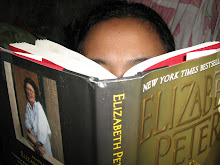Anyway, to get back to Rated K, we were sitting down to dinner while watching TV, and when that segment about the amaranhig came on, my parents began to laugh, and when we began to give them strange looks, they recounted their own experience-- during my older brother's funeral.
It was 1977, in the town where my mom grew up. My parents and my mom's relatives were on their way to the town cemetery to bury my stillborn older brother. They were following another funeral procession on the road-- a procession that kept stopping from time to time. My dad said they were actually supposed to go first on the road, but someone at the church had asked them to make way for the other funeral party who were "in a bit of a hurry." Why? Because, dad said, the coffin kept moving (nagtirimpugal) and what was inside kept banging against the coffin walls. It was the strangest funeral procession they'd ever seen, he said. Almost all of the mourners were men. The coffin had been placed on a cart (instead of in a hearse, as was usual)-- not just loaded on the cart, but lashed to it. And the coffin was also chained shut. The carabao pulling the cart, and the man leading the carabao, were also kind of spooked and kept glancing back nervously at the coffin. Each time the coffin moved or made a sound, the cart stopped, and someone sprinkled the coffin with holy water, and the coffin would stop moving. Dad said that when they buried the coffin, they didn't even bother taking it off the cart-- they just unhitched the carabao and lowered the cart itself into the grave. Maybe they didn't dare risk opening the coffin, he said. One of my mom's uncles went over to see for himself, and came back with the information that the other funeral was for an amaranhig-- who had been dead a week and was beginning to smell, and the family had gotten fed up with the dead man walking around, so they buried it with extra precautions.
According to our folk beliefs, being an amaranhig is a family curse, like the aswang. And also like the aswang, the afflicted person can die and rest in peace only if another person in the family agrees to take on the burden. Maybe, Dad said, no one in that family agreed to have the curse passed to him, so they just wanted to bury the curse with the amaranhig itself.












